West Bank family lives in tent after Israeli settlers attacked Palestinian village south of Hebron Hill
Memories of my beloved village occupy my mind daily. In my imagination, I see the fields where the sheep grazed, the water glimmering in the wells, and the abundant olive trees.
- 1 year ago
December 7, 2023
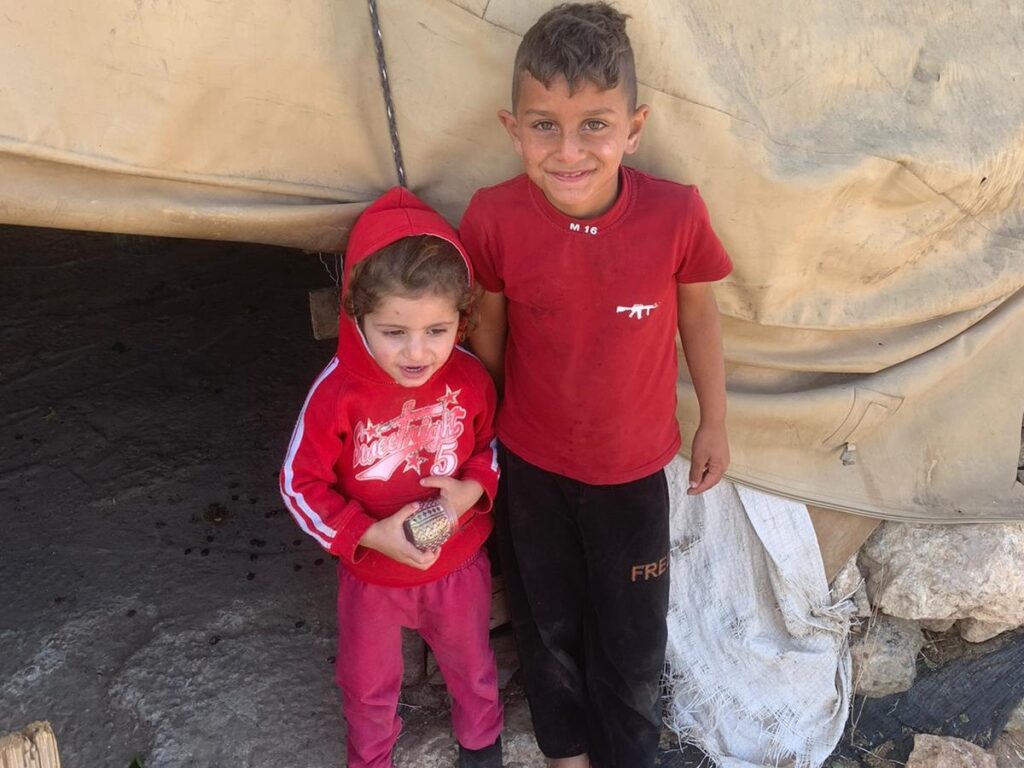 Mahmoud's children stand in front of the tent where the family lives now, after being displaced from their West Bank home by Israeli settlers. | Photo courtesy of Mahmoud Ayed
Mahmoud's children stand in front of the tent where the family lives now, after being displaced from their West Bank home by Israeli settlers. | Photo courtesy of Mahmoud Ayed
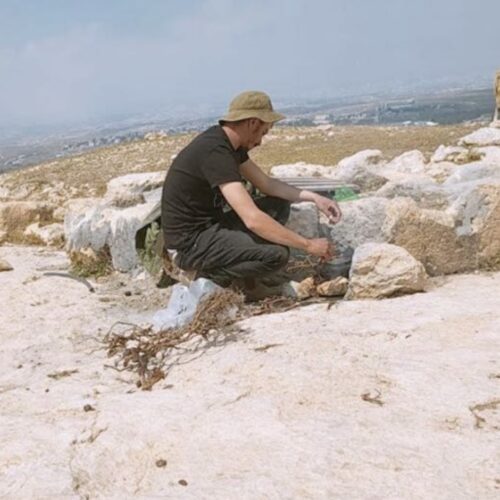
demolishing Palestinian villages, beating up Palestinian farmers, stealing their olives, trying to open a third front…” Vox reported that since the October 7, 2023 attack by Hamas on Israel, at least 15 communities have been fully displaced in the West Bank. Al Jazeera, reporting specifically on the region south of Hebron Hill where Orato’s story takes place, says “the daily rate of settler violence incidents in the West Bank has more than doubled” since October 7.
MUNEIZIL, West Bank — On October 20, 2023, Israeli settlers brutally attacked my village of Khirbet Al-Tawamin in the West Bank. On that terrible day, I watched as the settlers’ assaulted residents, slaughtered sheep, and callously set fire to our valuables, forcibly evicting families from their homes.
[According to multiple media sources including BBC, Vox, and Al Jazeera, since the October 7, 2023 Hamas attack on Israel, violence by radical settlers against Palestinians in the West Bank has skyrocketed. Links available in background section.]
My family and I fled our village south of Hebron Hill – the place I grew up, met my wife, and started my family; the place where I lost my eyesight as a child. Now my wife, children, and I live in a tent in Muneizil.
Read more stories out of the Israeli-Palestinian conflict at Orato World Media.
We left everything behind in our village in the West Bank
After the October 7, 2023 attack by Hamas on Israel, many settlers in the West Bank wanted reprisal. As innocent civilians living far away from Gaza, we did nothing wrong, but the settlers chose to carry out their payback upon us.
I have known aggression from settlers all my life, but the distressing escalation of violence in the West Bank following October 7 magnified that aggression. When they attacked my village, it felt like a relentless war machine that recognized no boundaries and showed no mercy.
Fleeing violence remains difficult for anyone, but as a visually impaired person with a disability, it becomes impossible to do so without help. The idea of protecting my children and navigating unfamiliar routes haunted my mind. I relied on family and friends just to make it to the neighboring village of Muneizil. [Note: Google maps does not officially recognize many Palestinian villages in the West Bank including Khirbet Al-Tawamin and Muneizil.]
The residents in Muneizil received my family and I warmly, generously providing us with a tent to protect us from the elements. This displacement, though, shattered my dreams. I imagined living in Khirbet Al-Tawamin all my life. It wasn’t easy there, but we had a roof over our heads.
There in the place I grew up, my heart and soul found rhythm in the darkness of the world. I knew every corner of my village by heart; it was integral to my existence. I found contentment inside the walls of our small house with my wife and kids and our three sheep. When the temperatures dropped in winter, I felt the warmth of our home embracing us. Now I wonder and worry, “How will we survive the harsh winter in a tent?”
Palestinian refugee in the West Bank just wants to go home
Now, as my family and I live in this tent outside, each minute feels like a year. The agonizing wait for the end of an unknown war leaves me anxious. Every day, I fervently pray for God’s mercy and the preservation of every life. I hear the echoes of collective anger in human voices and in nature; it is louder than any other sound now.
Facing a tragically dire situation, misery confronts me at every turn. Huddled together in our little tent, the wind howls and the rains pour down. The temperatures drop and the cold settles in. We hear the threatening sounds of wild animals in the distance and food becomes scarce. What little rations the displaced people stumble upon go to the little children first. The older kids survive on a mixture of water and onions.
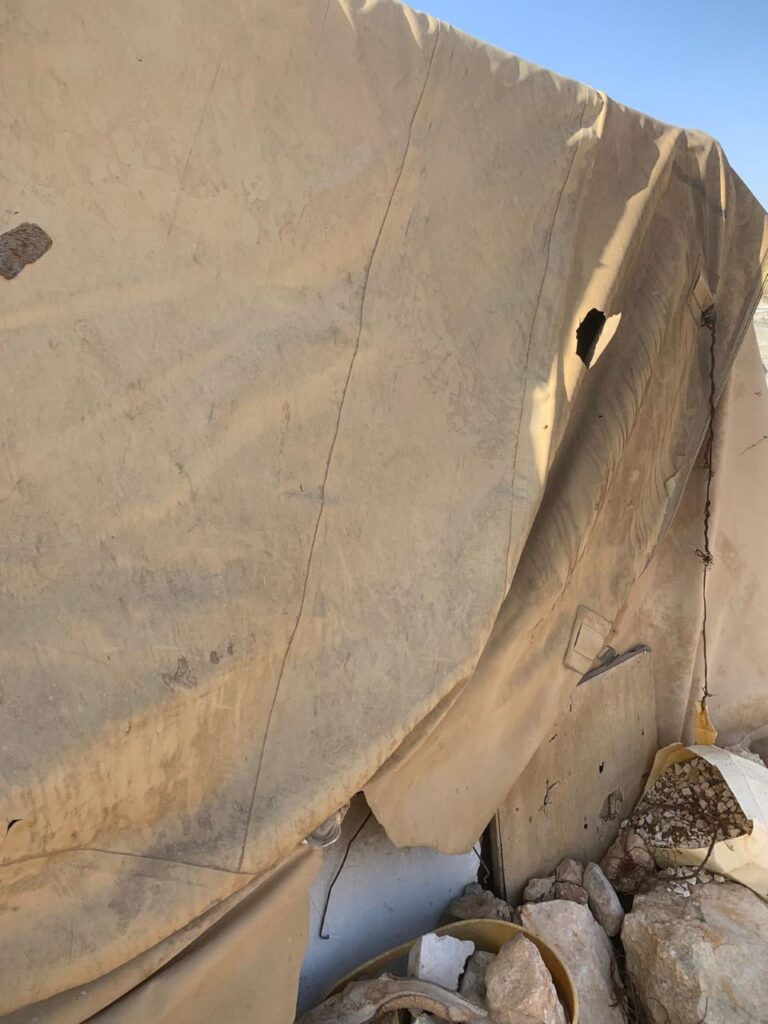
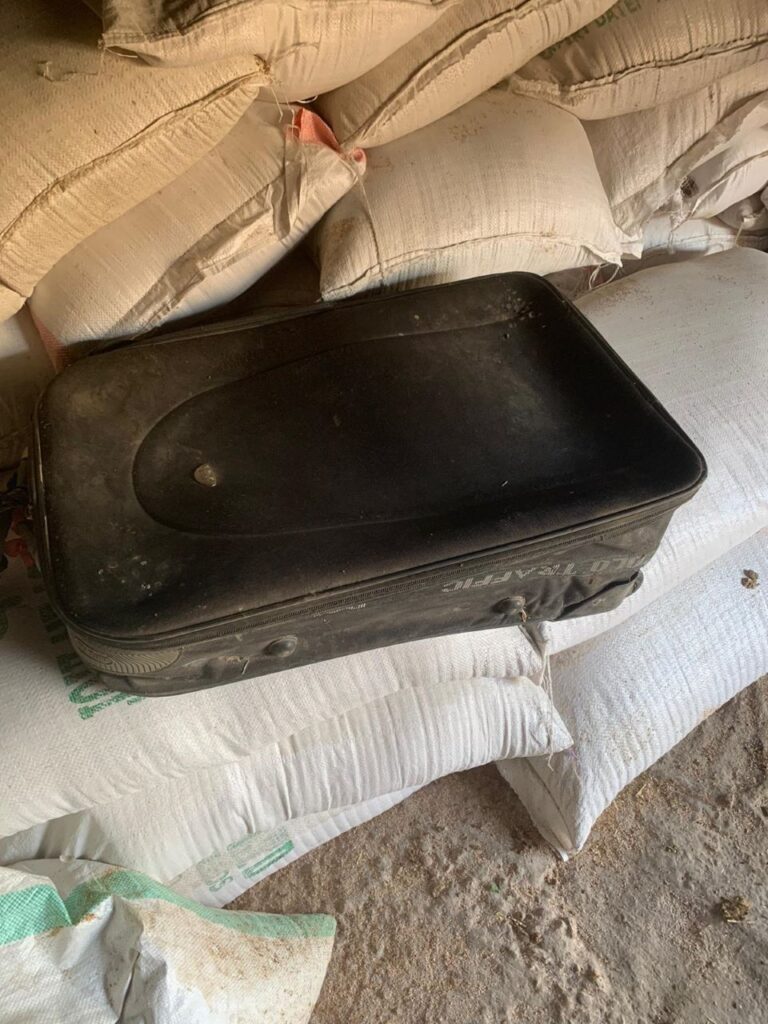
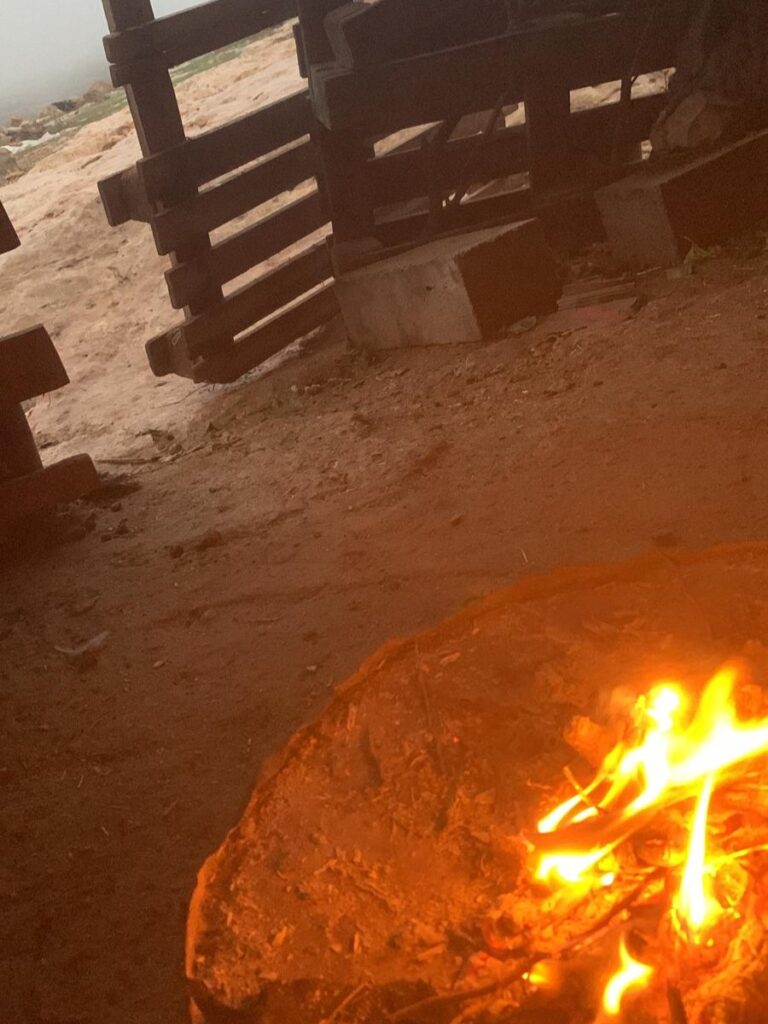
With no electricity, we face the darkness in despair. Unlike Gaza, it seems our situation in the West Bank remains invisible. “Where is our aid,” I wonder. “Why has no organization remembered us?” As the days pass, I feel forgotten. While my disappointment grows, I find solace when I hear the voices of my children. They spark hope in me, igniting my determination to rebuild our lives.
Memories of my beloved village occupy my mind daily. In my imagination, I see the fields where the sheep grazed, the water glimmering in the wells, and the abundant olive trees. It takes me back to my childhood – to a beautiful image of life without war and pain. I don’t want to be a refugee forever; I want to go home.
Elevate voices, Fund truth
Support journalists writing first-person news. Give
Translation Disclaimer
Translations provided by Orato World Media are intended to result in the translated end-document being understandable in the intended language. Although every effort is made to ensure our translations are accurate we cannot guarantee the translation will be without errors.
Related
Author Profile
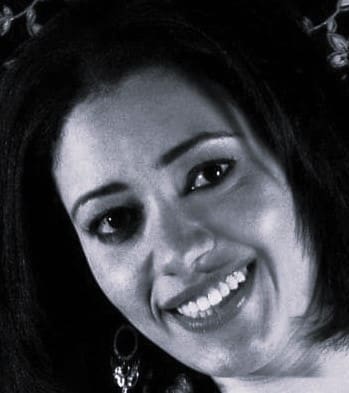
Mahasen Hawary
Mahasen Elhawary is an Egyptian seasoned professional in mass communication and journalism, based in London, United Kingdom. With over a decade of experience, Mahasen has contributed significantly to the field, specializing in journalism, translation, and social media. Her career journey has seen her work as a Senior Journalist at Akhbar El Yom Foundation, where she covered international film festivals, interviewed movie stars and filmmakers, and offered valuable insights as a movie critic. Mahasen's expertise extends to content creation, investigative reporting, and documentary production. She is also a skilled translator, having translated news, articles, and current affairs from international press for Alakhbar daily newspaper.
Author Bylines
- From the ruins of his home to the loss of his son: Gazan photojournalist captures the brutal realities of war
- Southport imam recounts being trapped amid violent mosque attack during U.K.’s far-right protests: “Their eyes filled with hatred and hostility”
- Rising anti-immigrant sentiments ravage my British dream
- Over 1,300 people died in Saudi Arabia’s Hajj pilgrimage to Mecca: eye witness recounts events
- “I decided to go to hell and get my family out:” man returns to Sudan in the midst of war
- Exploiting the vulnerable, even in death: nude photos of murdered social media influencer Om Fahd set dangerous precedent
- Egypt’s mobile clinics: A beacon of hope for the underprivileged amid economic crisis
- Relief convoy in Gaza turns deadly, survivors escape with bloodied bags of flour
- University professor flees from Gaza City, family now homeless and hungry in Rafah
- Destruction in Gaza captured through the lens of nine-year old war correspondent
- Doctor sexually abused sick woman in Egypt in front of her daughter, there is no justice
- Widow of murdered Saudi journalist and Washington Post columnist Jamal Khashoggi speaks out
- Palestinian, 20, imprisoned for a social media post recounts her ordeal in Israeli prison
- West Bank family lives in tent after Israeli settlers attacked Palestinian village south of Hebron Hill
- An unexpected guest arrived, and it was death: fire at a wedding reception in Iraq traps, kills, and injures hundreds
- “The chilling howls of grief pierced the night”: inside the devastating flood that destroyed Derna
- In a culture of honor killings and abuse, Egyptian woman returns to her husband but makes a change for the next generation
Perfil del autor

Mahasen Hawary
Mahasen Elhawary is an Egyptian seasoned professional in mass communication and journalism, based in London, United Kingdom. With over a decade of experience, Mahasen has contributed significantly to the field, specializing in journalism, translation, and social media. Her career journey has seen her work as a Senior Journalist at Akhbar El Yom Foundation, where she covered international film festivals, interviewed movie stars and filmmakers, and offered valuable insights as a movie critic. Mahasen's expertise extends to content creation, investigative reporting, and documentary production. She is also a skilled translator, having translated news, articles, and current affairs from international press for Alakhbar daily newspaper.
Autor de líneas de autor
- From the ruins of his home to the loss of his son: Gazan photojournalist captures the brutal realities of war
- Southport imam recounts being trapped amid violent mosque attack during U.K.’s far-right protests: “Their eyes filled with hatred and hostility”
- Rising anti-immigrant sentiments ravage my British dream
- Over 1,300 people died in Saudi Arabia’s Hajj pilgrimage to Mecca: eye witness recounts events
- “I decided to go to hell and get my family out:” man returns to Sudan in the midst of war
- Exploiting the vulnerable, even in death: nude photos of murdered social media influencer Om Fahd set dangerous precedent
- Egypt’s mobile clinics: A beacon of hope for the underprivileged amid economic crisis
- Relief convoy in Gaza turns deadly, survivors escape with bloodied bags of flour
- University professor flees from Gaza City, family now homeless and hungry in Rafah
- Destruction in Gaza captured through the lens of nine-year old war correspondent
- Doctor sexually abused sick woman in Egypt in front of her daughter, there is no justice
- Widow of murdered Saudi journalist and Washington Post columnist Jamal Khashoggi speaks out
- Palestinian, 20, imprisoned for a social media post recounts her ordeal in Israeli prison
- West Bank family lives in tent after Israeli settlers attacked Palestinian village south of Hebron Hill
- An unexpected guest arrived, and it was death: fire at a wedding reception in Iraq traps, kills, and injures hundreds
- “The chilling howls of grief pierced the night”: inside the devastating flood that destroyed Derna
- In a culture of honor killings and abuse, Egyptian woman returns to her husband but makes a change for the next generation






























































































































































































































































































